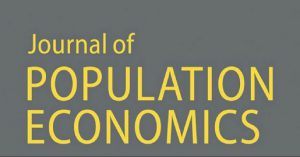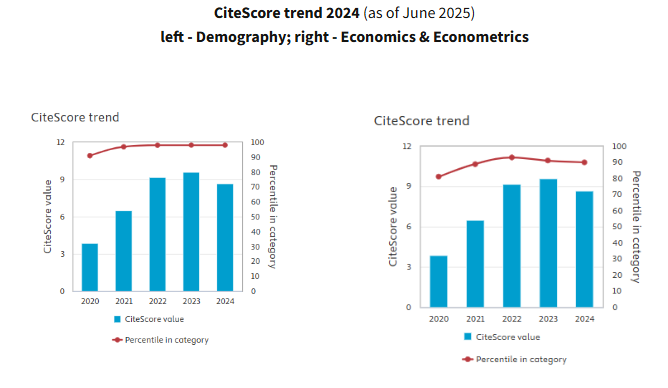
The Journal of Population Economics is a highly cited international quarterly that publishes original theoretical and applied research with significant policy relevance. Covering issues with challenging demographic contexts, its articles provide individual, household, firm, economy-wide and societal perspectives. A focus on United Nations Sustainable Development Goals (SDGs) is particularly welcome.
A. Individual, household or family studies cover partnership formation, divorce, fertility, education, work, migration, health, conflict, violence, risky behavior and aging.
B. Macro topics include economic growth with exogenous or endogenous populations, population policy, savings, pensions, social security, housing, and health care.
C. Societal challenges of interest include gender issues, wellbeing and happiness, sexuality, abortion, religion, poverty, inequality, war, peace and refugees.
D. Firm-related topics include personnel economics and management, skilled labor recruitment, working from home, diversity, robots and artificial intelligence.
E. Studies from business, other social sciences, medicine and related fields like human biology, development, history, and public choice are considered.
F. The journal is published in cooperation with Pop at UNU-MERIT and the Global Labor Organization(GLO).
Looking forward to your high-quality submissions and productive readership!
SSCI IMPACT FACTOR (IF): 3.3 (2023) from 6.1 (2022) – 5/49 in Demography & 101/597 in Economics in 2023.
IF is calculated as citations in 2023 to Web of Science indexed items published in 2021 & 2022 divided by the number of citable items in 2021 & 2022.
SSCI 5-Year Impact Factor: 4.1 (2023) from 5.0 (2022)
SSCI Journal Citation Indicator (JCI): 1.79 (2023) from 2.13 (2022). JoPE has 79% more citation impact than the average in its category in 2023.
Rank by JCI. Demography: 2/49 (2023) Q1 from 1/49 (2022); Economics: 45/600 (2023) Q1 from 24/581 (2022)
CiteScore (Scopus): 8.7 (2024) from 9.6 (2023); 2/140, Q1 in Demography & 72/732, Q1 in Economics and Econometrics in 2024. CiteScore 2024 counts the citations received in 2021-2024 to articles, reviews, conference papers, book chapters and data papers published in 2021-2024, and divides this by the number of publications published in 2021-2024.
SJR (Scimago Journal Rank): 1.805 (2024) from 2.7 (2023)
RePEc Simple Inpact Factor: 19.807 (June 2024), Rank 92 of 4,104 journals

While working already on contributions for volume 40: What they said in 2017 about the Journal of Population Economics on the occasion of the 30th year publishing articles in population economics.
Source: Zimmermann, K.F. Editorial: 30 Years Journal of Population Economics. Journal of Population Economics 30, 1–5 (2017). https://doi.org/10.1007/s00148-016-0621-0
Article FREE TO READ: https://rdcu.be/eq3lP
- “I read each issue”. James J. Heckman, University of Chicago
- “will become more important than ever”. Christopher Pissarides, London School of Economics
- “one of the most important journals of economics”. Kaushik Basu, Cornell University
- “a must read”. Janet Currie, Princeton University
- “an exceptional flagship for population economics”. Bob Gregory, Australian National University
- “a global forum for the rigorous exchange on scientific ideas”. Guillermina Jasso, New York University
- “Its reputation and success have surged”. Ronald Lee, University of California, Berkeley
- “leading journal of economic demography”. David Neumark, University of California, Irvine
Springer Website/submissions
Springer Website/volumes & issues
Google Scholar Citations: All-time JOPE article rankings
Editorial Office
Journal of Population Economics
E-mail: JOPE-Office@glabor.org
Useful information for readers & potential authors
- June 2025: CiteScore 2024 out – Journal of Population Economics stabilizes position as top field journal
- Springer Nature Editor of Distinction Awards 2025 for GLO President Klaus F. Zimmermann & the Journal of Population Economics.
- December 4-7, 2024: Global Online GLO-JOPE Conference 2024 on ‘Population Economics’ with highlights of the Journal of Population Economics (JOPE) issues 2, 3 & 4 of 2024 including the presentation of the JOPE 2025 Kuznets Prize. Full program and registration details: LINK
Videos of the JOPE I-V and Kuznets Prize sessions are available here:
Video Kuznets Prize 2025 Peter Eibich & Xianhua Zai “Grandparental Childcare Provision”
Video of JOPE Session I Dec 5
Video of JOPE Session II of Dec 5
Video of JOPE Session III of Dec 6
Video of JOPE Session IV of Dec 6
Video of JOPE Session V of Dec 6 - February 26-27, 2024: Online GLO-JOPE Winter Conference 2024 on ‘Population Economics’ with highlights of the Journal of Population Economics (JOPE) issue 1 (2024) of volume 37. CONFERENCE PROGRAM including links to the videos and to access the papers. LINK
- December 4-6, 2023: Global Online GLO-JOPE Conference 2023 on ‘Population Economics’ with highlights of the Journal of Population Economics (JOPE) issues 3 & 4 of 2023 including the presentation of the JOPE 2024 Kuznets Prize. Full program and registration details: LINK.
VIDEO of GLO-JOPE Global Conference 2023 Sessions A1-A5
VIDEO of GLO-JOPE Global Conference 2023 Sessions A6-A7 (Kuznets Prize Session)
VIDEO of GLO-JOPE Global Conference 2023 Sessions B1-B3
VIDEO of GLO-JOPE Global Conference 2023 Session B4
VIDEO of GLO-JOPE Global Conference 2023 Sessions C1-C3 - June 19, 2023. Collections and call for papers: JOPE invites paper submissions for the following collections:
– Abortions
– Covid-19 and diseases
– Lifecycle fertility models
– Sexual and domestic violence
– Sexuality including LGBT issues
– Statistics & measurement of population economics
For more details and for examples of already published papers in these collections see: https://glabor.org/collections-journal-of-population-economics-invites-paper-submissions-in-six-research-areas/ - April 27, 2023: JOPE SPRING 2023 WORKSHOP — meet the authors online. Program & Registration. Vol. 36, Issue 2, April 2023: Journal of Population Economics (JOPE) 16 articles. https://link.springer.com/journal/148/volumes-and-issues/36-2. Report & Video.
- December 1, 2022. GLO Global Conference 2022 has program links for JOPE issue 1/2023, Vol. 36, articles, the Kuznets Prize 2023 Ceremony, and access to published papers & session videos.
- July 15, 2022 Journal of Population Economics Summer 2022 Event. Program & Event Video. Presents most authors, paper access & videos of JOPE issues 3 +4 of 2022.
- June 1, 2022: JOPE (Journal of Population Economics) Research Workshop on Abortion Issues II; Program & Registration. Event Video & Report.
- May 31, 2022: JOPE (Journal of Population Economics) Research Workshop on Abortion Issues I; Program & Registration. Event Video & Report.
- April 25, 2022: Meet authors of Issues 35 (1+2): JOPE Spring 2022 Event. Call for participation. Event Video & Report.
- JOPE Editor-in-Chief Report 2021; Draft 15 March 2022: PDF
- December 6, 2021: Meet authors of Issues 34 (4) & the Kuznets Prize 2022 winners on Covid-19 issues: JOPE December 2021 Event. Program & Video.
- May 27, 2021: JOPE Summer 2021 Event. Meet authors of Issue 34 (3). Program & Video.
- January 28, 2021: JOPE Winter 2021 Event. Meet authors of Issue 34 (2). Program, Report & Video.
- November 19, 2020: JOPE Fall 2020 Event. Meet authors of Issue 34 (1) & the Kuznets Prize 2021 winners. Program, Report & Video.
- Discussion Papers like the GLO Discussion Papers are preprints and do not count as publications. See for instance the Springer Preprint Sharing policy. The Journal of Population Economics values manuscript submissions with DP history.
Editor-in-Chief
Klaus F. Zimmermann
Global Labor Organization (GLO) & Free University Berlin, Germany
klaus.f.zimmermann@gmail.com
Managing Editor
Madeline Zavodny
University of North Florida, Coggin College of Business, Jacksonville, USA; m.zavodny@unf.edu


Editors
Xi Chen, Yale University, USA; xi.chen@yale.edu
Shuaizhang Feng, Jinan University, Guangzhou, China; shuaizhang.feng@foxmail.com
Alfonso Flores-Lagunes, Maxwell School of Citizenship & Public Affairs, Syracuse University, USA; afloresl@syr.edu
Oded Galor, Brown University, Providence, USA; Oded_Galor@Brown.edu
Astghik Mavisakalyan, Curtin University, Australia; astghik.mavisakalyan@curtin.edu.au
Terra McKinnish, University of Colorado Boulder, USA; terra.mckinnish@colorado.edu
Milena Nikolova, University of Groningen, The Netherlands; m.v.nikolova@rug.nl
Grégory Ponthière, ENS-Rennes, France; gregory.ponthiere@ens-rennes.fr
Kompal Sinha, Macquarie University, Sydney, Australia; kompal.sinha@mq.edu.au









Associate Editors
Emma Aguila, University of Southern California, USA
Viola Angelini, University of Groningen, The Netherlands
Ainoa Aparicio-Fenoll, University of Turin, Italy
Cynthia Bansak, St. Lawrence University, USA
German Blanco, Illinois State University, USA
Lisa Cameron, University of Melbourne, Australia
Siyu Chen, Jinan University, Guangzhou, China
Yi Chen, ShanghaiTech University, China
Andrew Clark, Paris School of Economics, France
Janice Compton, University of Manitoba, Canada
Helmuth Cremer, GREMAQ and IDEI, University of Toulouse, France
Avraham Ebenstein, Hebrew University of Jerusalem, Israel
Gil S. Epstein, Bar-Ilan University, Ramat Gan, Israel
Raphael Franck, University of Stuttgart, Germany
Melanie Guldi, University of Central Florida, USA
Rufei Guo, Wuhan University, China
Moshe Hazan, Monash University, Australia
Hugo Jales, Syracuse University, USA
Fabian Kindermann, University of Regensburg, Germany
Kai A. Konrad, Max Planck Institute for Tax Law and Public Finance, Munich, Germany
Eliana La Ferrara, Harvard University, USA
Nils-Petter Lagerlöf, York University, Canada
Anthony Lepinteur, University of Luxembourg, Luxembourg
Mahreen Mahmud, University of Exeter, UK
Olga Malkova, University of California, Irvine, USA
Subha Mani, Fordham University, USA
Rigissa Megalokonomou, Monash University, Australia
Ömer Özak, Southern Methodist University, Dallas, USA
Olga Popova, Leibniz Institute for East and Southeast European Studies, Regensburg, Germany, and CERGE-EI, Prague, Czech Republic
Hillel Rapoport, Paris School of Economics, France
David Ribar, Georgia State University, USA
Nicolas Salamanca, University of Melbourne, Australia
Nina Smith, Aarhus University, Denmark
Uwe Sunde, Ludwig-Maximilians-Universität, Munich, Germany
Massimiliano Tani, UNSW Canberra, Australia
Emmanuel Thibault, Toulouse School of Economics & University of Perpignan, France
Sunčica Vujic, University of Antwerp, Belgium
Sen Xue, Jinan University, Guangzhou, China
Myra Yazbeck, University of Ottawa, Canada
Liqiu Zhao, Renmin University of China, Beijing, China
Zhong Zhao, Renmin University of China, Beijing, China
Nicolas Ziebarth, University of Mannheim and ZEW, Germany
Advisory Board
Orley Ashenfelter, Princeton University, USA
Kaushik Basu, Cornell University, Ithaca, USA
Barry R. Chiswick, The George Washington University, Washington DC, USA
Janet Currie, Princeton University, USA
Ashwini Deshpande, Ashoka University, India
James J. Heckman, University of Chicago, USA
Richard Layard, London School of Economics
Giovanni Peri, University of California Davis, USA

Ends;
